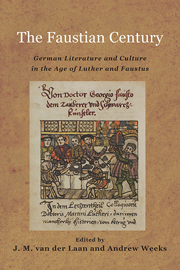Book contents
- Frontmatter
- Contents
- List of Illustrations
- Acknowledgments
- Introduction: Faust Scholarship and the Project at Hand
- 1 The German Faustian Century
- 2 Faustus of the Sixteenth Century: His Life, Legend, and Myth
- 3 Cornelius Agrippa's Double Presence in the Faustian Century
- 4 Converging Magical Legends: Faustus, Paracelsus, and Trithemius
- 5 Faust from Cipher to Sign and Pious to Profane
- 6 The Aesthetics of the 1587 Spies Historia von D. Johann Fausten
- 7 The Lutheran Faust: Repentance in the Augsburg Confession and the German Faustbuch
- 8 Marriage in the Historia von D. Johann Fausten (1587)
- 9 Antiauthoritarianism and the Problem of Knowledge in the Faustbuch
- 10 Exploring the “Three-Fold World”: Faust as Alchemist, Astrologer, and Magician
- 11 The Devil in the Early Modern World and in Sixteenth-Century German Devil Literature
- 12 Encounters with “Schwarz-Hans”: Jacob Böhme and the Literature of the Devil in the Sixteenth Century
- 13 D. Johann Faust and the Cannibals: Geographic Horizons in the Sixteenth Century
- A Sixteenth-Century Chronology of Significant References to Faust with Parallel World Events
- Select Bibliography
- Notes on the Contributors
- Index
7 - The Lutheran Faust: Repentance in the Augsburg Confession and the German Faustbuch
Published online by Cambridge University Press: 05 May 2013
- Frontmatter
- Contents
- List of Illustrations
- Acknowledgments
- Introduction: Faust Scholarship and the Project at Hand
- 1 The German Faustian Century
- 2 Faustus of the Sixteenth Century: His Life, Legend, and Myth
- 3 Cornelius Agrippa's Double Presence in the Faustian Century
- 4 Converging Magical Legends: Faustus, Paracelsus, and Trithemius
- 5 Faust from Cipher to Sign and Pious to Profane
- 6 The Aesthetics of the 1587 Spies Historia von D. Johann Fausten
- 7 The Lutheran Faust: Repentance in the Augsburg Confession and the German Faustbuch
- 8 Marriage in the Historia von D. Johann Fausten (1587)
- 9 Antiauthoritarianism and the Problem of Knowledge in the Faustbuch
- 10 Exploring the “Three-Fold World”: Faust as Alchemist, Astrologer, and Magician
- 11 The Devil in the Early Modern World and in Sixteenth-Century German Devil Literature
- 12 Encounters with “Schwarz-Hans”: Jacob Böhme and the Literature of the Devil in the Sixteenth Century
- 13 D. Johann Faust and the Cannibals: Geographic Horizons in the Sixteenth Century
- A Sixteenth-Century Chronology of Significant References to Faust with Parallel World Events
- Select Bibliography
- Notes on the Contributors
- Index
Summary
Lutheran Theology and the Faustbuch
Near the beginning of the sixteenth century, Martin Luther found new meaning in the Pauline expression justification by faith through the hermeneutic concept sola scriptura. Luther's theological discovery inspired others to articulate and invoke fundamental religious, political, and cultural changes within the European societies. At the same time, the Protestant Reformation gave rise to a tension between a religious and a humanistic outlook. Many solutions put forward to overcome this tension were informed by fear or fascination and appear to us as reactionary or progressive. Such figures as Paracelsus, Erasmus, Trithemius occupied a place between the strict confines of religion on the one hand and humanism on the other. By the end of the century, a new literary figure, Doctor Faustus, presented himself to the public in northern Europe. In a remarkable way, the protagonist of the story told in the Faustbuch encapsulated the tensions between religion and humanism. Epitomized in his demonic bargain, these interrelated and opposing tendencies confronted one another in his person. Given the complicated intersections of those two spheres at that time, the period as a whole may be described with the help of the term Faustian.
The present chapter brings key Lutheran material into dialogue with the first literary “biography” written about the learned magician Doctor Faustus who famously entered into a pact with the devil. Specifically, the aim of this analysis is to investigate elements in the original Frankfurt Faustbuch from the year 1587 that bear striking resemblances to the early Lutheran statement of faith, the Augsburg Confession of 1530, or its revised continuation, the Book of Concord of 1580.
- Type
- Chapter
- Information
- The Faustian CenturyGerman Literature and Culture in the Age of Luther and Faustus, pp. 177 - 196Publisher: Boydell & BrewerPrint publication year: 2013



